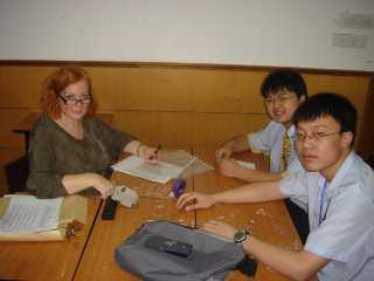The Communicative Approach in China. Bronwyn Miller (sitting, left) teaches English in Shanghai. In this short piece she considers the problems of using communicative methods.
China is currently striving to nationally improve its English language levels however the Communicative Approach has not been widely accepted; there are several reasons for this.
The Chinese educational system focuses on multiple-choice exams and although in high schools there was a listening component it was abolished in 2005; the government cited that the lack of recorders in some poorer regions meant that some students were unfairly disadvantaged. There has never been a speaking component in their exams.
Rote learning is overwhelmingly the norm and in situations where students are orally tested, students attempt to memorize what they anticipate will be tested. This is also the case with the IELTS speaking exam. Class numbers of over 35 students creates further difficulties to effectively teaching communication skills.
In my role as DOS on a TAFE Program in Shanghai; oral testing attempted to include both cultural norms. Eight questions covering business topics from the course are given to students one week before their exam. This gives students the opportunity to prepare and memorize a one to two minute presentation in all topics and is useful for revision. On entering the exam room a candidate picks a card with one topic on it. Although they have memorized their one to two minute talk, the follow-up questions cannot be prepared in advance.
Also the writing skill is not systematically taught and typically students hand in diaries on a weekly basis. Local teachers say that they have never leant that specific genre have the same internal structure, containing the same components in the same order.
From the perspective of a local Chinese English teacher a Western EFL teacher is paid substantially more however they view group work and discussions as ‘playing’. They argue that they are left doing the ‘real teaching’; ploughing through difficult reading and listening classes and covering/translating masses of new vocabulary. However the Western teacher often becomes more popular as the students enjoy their classes and this has to lead to resentment.
However most class textbooks in China nowadays have speaking and genre writing components in each unit and many local EFL teachers are exploring ways to include them in their courses.